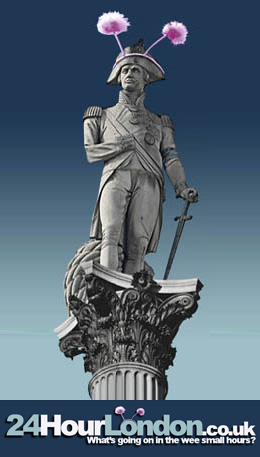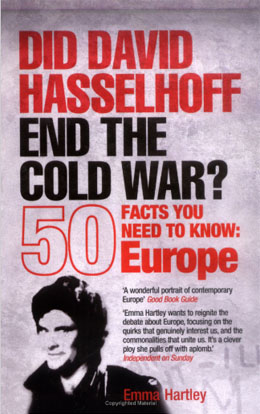She wasn't the only one. It was a bit stressful.
So Polwart was a trouper for picking up two plastic chairs and setting them down behind the signing tent, where fewer people would spot her, for a brief chat.
Her song Sorry (above) really reminds me of something from the American TV series Deadwood (below), I told her.
"That is so weird. I was obsessed with Deadwood." I suddenly had her full attention. "Being a musician I can never watch anything on a weekly basis because I'm always out working. So there's an underground trade in HBO box sets on the Scottish folk scene and that one was on my mind for months. At the moment it's Borgen and The Killing."
And we're off... So it seems that Scottish female singers are having a bit of a Disney moment, what with Julie Fowlis doing all that work on Brave, and Cara Dillon writing a song for Disney World as well as doing the narration for Tinkerbell. With a cast of mind that appreciates the operatic levels of bloodshed, betrayal and alienation in Deadwood, could Polwart ever see herself doing Disney?
"Well, I think it was a bolt from the blue for Julie. It's the kind of phone call we all dream about getting. But both Cara and Julie have bell-like voices. They have the kind of voices that, if you were to think about folk and you didn't have a notion of what was about, you might think of beautiful voices like theirs. Mine is a bit too screechy - it doesn't have the same cut-glass quality. And they come from a different tradition from me. They are both a part of the Gallic or Gaelic song tradition and use their voices in a completely different way.
"Julie Fowlis is a tremendous musician - she has a degree in cultural studies and musicology. And, let's face it, there are only so many ways that a folk singer is likely to be given an opportunity like that. It's a massive opportunity. It's every songwriter's dream to have a song of theirs used in a film or on TV because it puts you before an audience you wouldn't ordinarily have and allows you to transcend your genre.
"One of mine - Cover Your Eyes - was on a television documentary recently called You've Been Trumped, which was about Donald Trump and the golf course, and Sigur Ros were on the soundtrack as well. So that was good.
"But I've written an album of songs about child murder, so I'm probably not the right person for Disney."
Um, why did you do that?
"I have two little kids and it's my worst nightmare. And I write from a place where everything has to matter to me. So I'd probably be a rubbish person to write something to a specification for someone else. I'm not sure I could write in the abstract."
But surely writing something to a specification isn't writing in the abstract?
"I have friends who write songs for Nashville. What I mean is that I can only write music for myself. However... I worked on the Darwin Song Project a while back and the one that I kept was the one that meant the most to me, which was We're All Leaving (below). That's another one about child death."
Yes. I can see a pattern developing here.
"I'd just had one baby and I think I was pregnant again... I write about the risks that are most relevant to me at the time."
So do you ever write political songs?
"Sorry would probably be the closest to a political song that I've written. I've never explained to anyone what that's about, which was an accident to start off with. But then I really liked the responses that I got to it. People would interpret it and the interpretations were more interesting than my original idea..."
She's clearly really enjoyed seeing the song take on a life of its own, so much so that she was pretty reluctant to say where the original thought came from. 'Sorry' won't pay for this loss, the lyric runs.
"It was of a time when there was a lot of George Bush and Tony Blair and the Iraq War in the air. That may have been what kicked it off. But I like that the song is a bit enigmatic. That's my choice when I write about political issues: I like to make other people do the work.
"I studied philosophy and for a long time I was all about community-based philosophy, which would be going on in schools and pubs. That was what I wanted to do with my life - but no one wanted to fund it. And yet I feel that is what I do with my life, oddly. There's work to be done making these things - the things we habitually talk about - meaningful.
"Don't get me wrong. It's not that I find talking about politics boring. I find it fascinating. I just don't think it's my job to deliver a lecture. I don't like preaching to people."
She's actively involved with the Green Party in Scotland, which she says is in favour of independence at the moment. "And I'm swaying to a yes on it too, though it's about having more power residing locally for me. I'm not a nationalist."
Local for her is Pathhead in Midlothian. "There are sixteen professional musicians in a village of only 900, including Martin Green from Lau. We've got folk, jazz and experimental musicians - Inga," who plays in Polwart's band, wearing the headscarf to cover alopecia, "Inga lives in Pathhead too. There is a session on a Thursday night in the Foresters' Arms on the main street and we have fiddles, box players and a pipemaker who plays in a band with some Indian musicians," which sounds as if it would be worth seeking out if one were touring Scotland by car, for instance.
So does Polwart dance?
"Oh. What a question. Dancing makes me very uncomfortable - unless it's ceilidh dancing of course, in which case it's genetic and everyone does it. But I'm not one for dancing in clubs, no."
And what's she listening to these days?
"If I'm listening and really listening, my favourite at the moment is Anais Mitchell. Her new album is mighty, just mighty. I love it. And then there's Laura Veirs, who trained to be a scientist of some kind - was it meteorology? - before turning to music, and so all of her images are science-based images and they're just absurdly beautiful.
"And, of course, I have two small children - a five-year-old son and a two-year-old daughter," with her sound engineer partner, "so there are lots of counting songs. And I like Gillian Welch."
This leads to a discussion about Louise Mensch, the former Conservative MP who's husband, Peter Mensch, manages Welch (as well as Metallica). "I liked Louise Mensch. I'm sorry to see her leave parliament," said Polwart. "She's articulate and she didn't mince around with her words. I was enjoying seeing a woman in public life - on the culture committee, wasn't it? - who spoke her mind even if I didn't always agree with her."
Me too. So what's next?
"I really need a project. I like being asked to do things and at the moment I really need a project for when I've finished touring with this album. I'm thinking that it might be time to focus some of my energy much closer to home musically than I have been doing. When I got into music it was through the community in my village - I was in a band as one of about eight singers. And I have a strong sense of obligation. There is a bank of young ladies in Pathhead of 11 or 12 years old who would go for it, if we set something up. It seems only right in a village full of musicians."
And with the admission that I'd come to the end of my line of questioning, Polwart sprang to her feet and, whirling a plastic chair over head, was gone in a trice leaving only a few pages of my notebook blowing in her wake.
* You can buy a copy of Karine Polwart's new album, Traces, here.
* And here are a couple of other posts from Shrewsbury. Firstly, this and this about the webstreaming, which is continuing now the festival's over, on a requests basis. And this about a young band called Blue Horyzon, who were busking there.
* If you'd like to receive posts from this blog directly into your Facebook news feed - or at least stand a 15 per cent chance of doing so, according to the new algorithm that manages these things - you could *like* its Facebook page. Or follow me on Twitter @emma1hartley













